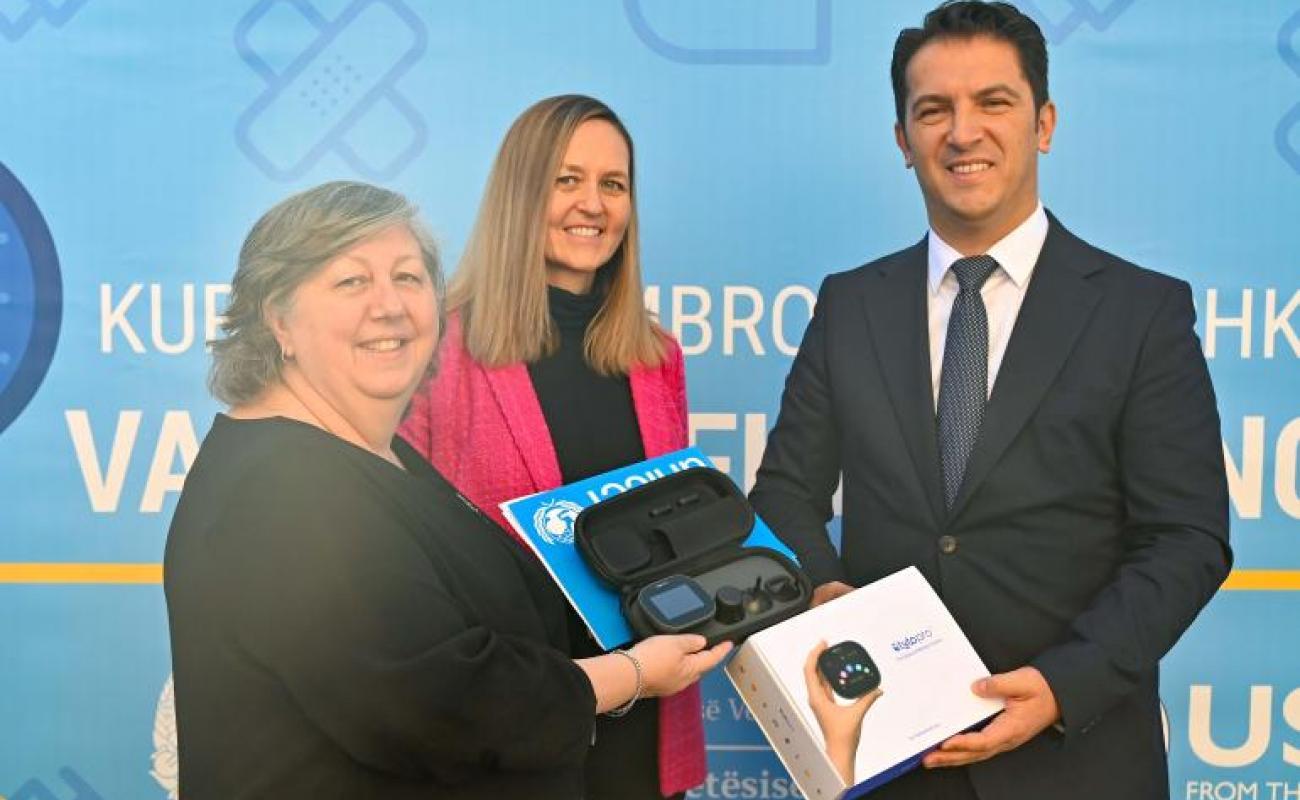Telemedicine pilot put into practice with new remote health monitoring devices

Skopje, 27 October 2022 - Today, the Ministry of Health put into practice a telemedicine pilot initiative after receiving from United Nations Children’s Fund (UNICEF) and United States Agency for International Development (USAID) fifty remote health monitoring devices that will allow doctors to conduct physical examinations remotely.
The devices will be provided to vulnerable families and used by doctors trained to deliver telemedicine services through a UNICEF and USAID supported telemedicine initiative. The initiative aims to provide alternatives to the traditional face-to-face health consultations in the cases when physical presence is not possible, or is not necessary, and to increase equitable access to health care services.
With the remote health monitoring devices, doctors will be able to extend the reach of the clinician beyond the four walls of the clinic. They will be able to conduct physical examinations of patients remotely to diagnose acute conditions such as: ear infections, sore throats, fever, cold and flu, allergies, stomach issues, upper respiratory infections and rashes. One of the key advantages is monitor chronic conditions for the most vulnerable and follow up and monitoring of patients’ post-procedure, including COVID-19.
“During the piloting phase, technical experts from the Ministry of Health and the Macedonian Medical Association will closely work with UNICEF, to share experience on the use of the devices from both primary healthcare doctors and patients. Data will be collected to follow up the number of interactions, examinations, type of diagnosis, patients age, and other measurable indicators. Based of shared experiences, we will explore opportunities to scale up the initiative to provide accessible, adequate, equitable and high-quality services to all and especially the most vulnerable,” said Minister of Health, Dr. Bekim Sali.
Doctors in the country have been relying on phone or video conferencing to deliver telemedicine services, however these have been limited to examine and diagnose a patient, without the benefit of a physical exam. The new remote monitoring devices will now allow doctors to remoting examine patient’s heart and lungs with high-quality digital sounds; ears, throat, and skin with high-quality digital images and video; and measure heart rate and body temperature.
“During the COVID-19 pandemic families faced disruptions within health care, which led to a significant reduction of health service delivery to children and families. Digital technology and new models of care allowed countries to ensure health systems are resilient. This is why UNICEF remains committed to supporting the Ministry of Health to establish innovated services delivery models for children and families. We will continue to support health system strengthening through digitalization, and this is part of UNICEF broader support to the Ministry of Health to ensure greater access to quality, integrated and inclusive health care for all children,” said Patrizia DiGiovanni, UNICEF Representative.
The innovative and comprehensive approach with the remote-monitoring devices, from appointment to virtual visit and on to care plan is not only time saving, but also stress saving and is considered to save families of the financial hardship from traveling and waiting in health facilities. It can help prevent unnecessary referral of patients between various health service levels and reduce physical appointments which is of high importance for patients for which moving frequently is a burden and a risk.
“USAID is pleased to partner with UNICEF and the Ministry of Health to roll out this important pilot initiative for bridging the barrier between primary care providers and patients in rural areas. Our joint efforts to boost reliable and quality medical care during the COVID-19 pandemic have illustrated the importance of telemedicine and the critical need for preliminary screenings to determine if follow-up care is required. These monitoring devices will enable doctors to perform medical screenings and capture reliable vital patient information without requiring an in-person consultation. The pilot initiative will allow patients to receive quality care and also alleviate the overburdened medical specialists in North Macedonia,” said Mr. Diego Marquez, Acting USAID Country Representative.
The procurement of remote-monitoring devices is part of UNICEF broader support to the Ministry of Health in COVID-19 response and health system strengthening through digitalization and is funded by the United States Agency for International Development.
